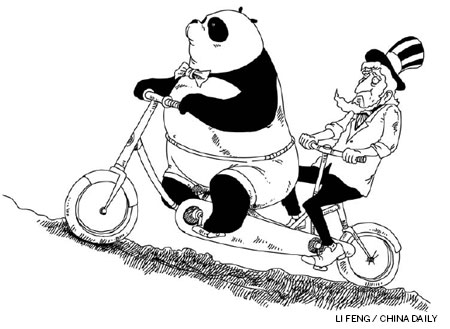Change drives China-US talks
Updated: 2013-07-17 09:54
By Dan Steinbock (China Daily)
|
||||||||
Although many jaded US political observers say the S&ED has become unwieldy and excessively process-oriented, the reality is that things are changing. The operating environment of the US-China talks is shifting toward multipolarity - as proven by a slate of proposed regional trade deals and the cybersecurity debate.
US-China dialogue rests on strategic and economic tracks. The former covers vital security issues, such as Chinese military modernization, maritime disputes in Asia, US strategic pivot to Asia, bilateral military-to-military relationship, Iran's nuclear program and the denuclearization of the Korean Peninsula. It also includes cross-Straits relations and US arms sales to Taiwan.
In cybersecurity, former National Security Agency contractor Edward Snowden's expos of the US surveillance program created a storm in both countries, as well as the rest of the world, and severely harmed US credibility. In China, many political analysts say that, after the popularity of the Barack Obama administration began to fall, it became more vocal in alleging that China had violated cybersecurity.

Now China, along with other BRICS member states and Germany, accuses the US and US-based interests of violating cybersecurity. It also accuses the NSA of having cozy relationships with the largest US-based Internet giants, from Google to Microsoft, saying they should be commercial companies rather than extensions of the government's intelligence wing.
Not surprisingly, the inaugural session of the highly anticipated US-China bilateral working group on cybersecurity preceded the S&ED meeting, enabling both sides to insulate the Strategic and Economic Dialogue from the cybersecurity flames.
In the ultimate analysis, though, cybersecurity is a global challenge and requires multipolar cooperation.
The S&ED focused on economic issues, including China's reforms, bilateral trade deficit, innovation policies and intellectual property rights, the US' quantitative easing (QE) and China's currency policy, US Treasuries held by China and global trade issues.
The Bilateral Investment Treaty talks rep
Most Viewed
Editor's Picks

|

|

|

|

|

|
Today's Top News
Royals 'waiting by telephone' for Kate's baby
US attorney general questions gun law
China's US T-bill holdings hit record in May
iPhone death probed by Apple
Spring agency flourishes with travelers to US
Chinese textile industry aims for 'green'
GM's sales up 4% on strong US, China demand
New visa law offers lifeline to foreigners
US Weekly

|

|













